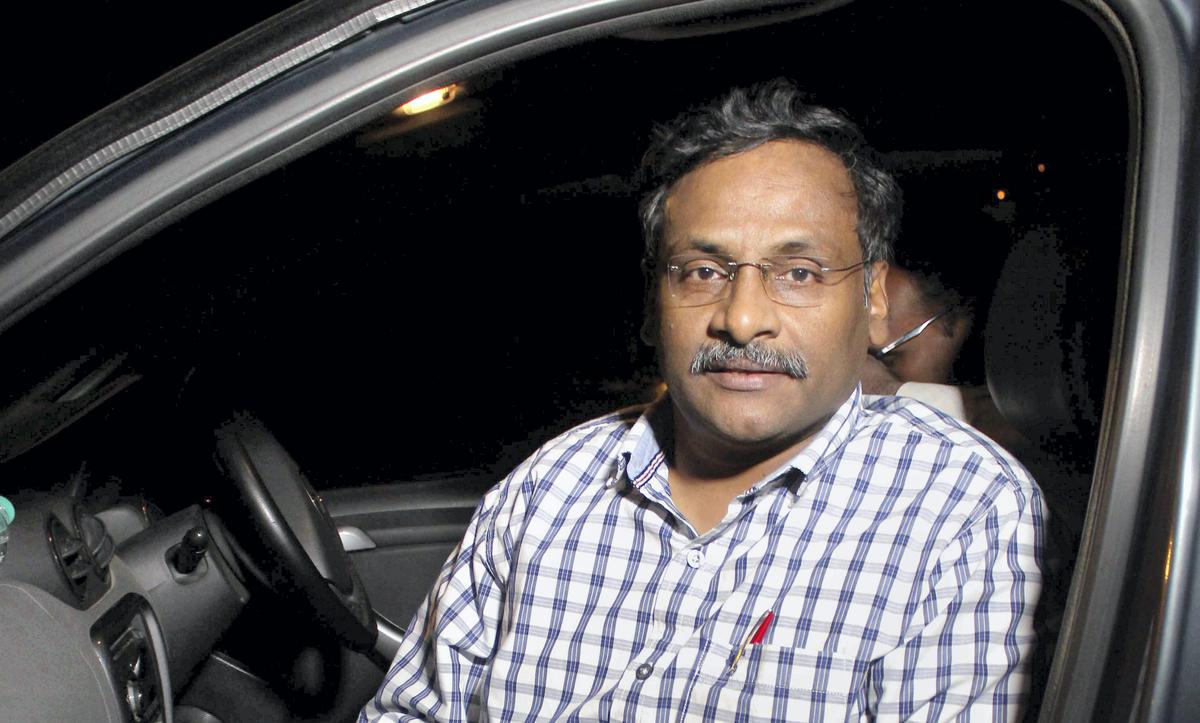
Explained | What is the case against former DU professor G.N. Saibaba?
The Hindu
The 55-year-old wheelchair-bound academic was arrested from Delhi in 2014 for having alleged Maoist links and subsequently convicted by a Maharashtra sessions court in 2017
The story so far: In the 24 hours between October 14 and 15, former Delhi University professor G.N. Saibaba, was first acquitted by the Nagpur Bench of the Bombay High Court citing a procedural lapse in the Maoist-links case followed by the suspension of his acquittal the next afternoon by a special Bench of the Supreme Court, which stated that the High Court did not consider “the merits of the case including the gravity of the offence”. The acquittal of five other accused persons along with the academic was also suspended.
Gokalkonda Naga Saibaba, 55, is a former professor at Delhi University’s Ram Lal Anand College and was terminated from service by the college in March 2021. The college had suspended him in 2014 when the activist-academic was arrested in Delhi for having alleged Maoist links.
Mr. Saibaba was born in Amalapuram, Andhra Pradesh, in 1967. He completed his Masters in Arts from Hyderabad and joined the Central Institute of English and Foreign Languages to pursue a postgraduate diploma in teaching English in 1991. Mr. Saibaba has been wheelchair-bound since 2008, has been crawling since the age of five because of polio and suffers from medical ailments. According to his family and lawyers, his left hand is presently on the verge of failure,with acute pain spreading to both hands. He suffers from pancreatitis, high blood pressure, cardiomyopathy, chronic back pain, immobility and sleeplessness.
In an interview with The Hindu during a brief three-month period in 2015when he was out on bail for medical treatment, the former professor said that in the 1990s, he started off as a pro-reservation activist against attempts to scrap the reservation policy for lower-caste Indians. He then began campaigning against the Andhra Pradesh Police for what he called “encounter killings” of innocents and Naxalites. He also campaigned against Chattisgarh’s Salwa Judum militia of tribal youths that was mobilised by authorities as a part of the counterinsurgency mission against Naxalites and was declared illegal and unconstitutional by the Supreme Court in 2011.
After teaching in a college in the State for a decade, he moved to Delhi in the early 2000s and began teaching English Literature at Delhi University in 2003. It was also around this time that he began campaigning against the military offensives in tribal areas. He later campaigned in central India’s tribal belt against the Congress government’s Operation Green Hunt, a military offensive aimed at flushing out Maoist rebels.
On May 9, 2014, when Mr. Saibaba was on his way home from the University, he was arrested by a joint team comprised of the Maharashtra police, Andhra Pradesh police, and the Intelligence Bureau in a case pertaining to ties with Maoist organisations. The morning after his arrest, Professor Saibaba was flown to Nagpur, where the District Magistrate remanded him to custody in prison. Besides being out on bail on medical grounds for brief periods, the academic has been lodged in the Nagpur Central Jail since 2014, being moved to the jail’s ‘anda cell’ (solitary confinement) since his conviction on March 7, 2017.
In February 2017, a sessions court in Maharashtra’s Gadchiroli district convicted Mr. Saibaba and five others for having connections with and being “active members” of the outlawed Communist Party of India (Maoist) and the Revolutionary Democratic Front (RDF), described by the police and the court order as a front for CPI(M). While the Mr. Saibaba and four others were sentenced to life imprisonment, the sixth accused was given a 10-year term.





















 Run 3 Space | Play Space Running Game
Run 3 Space | Play Space Running Game Traffic Jam 3D | Online Racing Game
Traffic Jam 3D | Online Racing Game Duck Hunt | Play Old Classic Game
Duck Hunt | Play Old Classic Game











